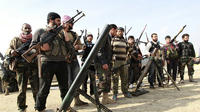-
Immigration violators spend long stretches in Washington jail
The Immigration and Customs Enforcement (ICE) can place holds on people booked into jail who may be in the United States illegally. A study of King County, Washington, jail data from 2011 found that about one in eight people with ICE holds were not charged with any crime. It also found that half of the inmates with holds were charged with misdemeanor crimes, including driving without a license. Moreover, if ICE has placed a hold on an individual in the King county jail, that individual will stay in jail an extra month on average. King county officials says all this costs the county too much money, and they want ICE to limit its holds for those who committed serious crimes.
-
-
Bipartisan Group of Eight to unveil immigration reform bill in early April
The bipartisan group of senators known as the Group of Eight, currently finalizing the details of a sweeping immigration bill, said on Wednesday that they will be ready to unveil their plan to Congress when it gets back to work in April. Four of the senators visited the U.S.-Mexico border to observe security operations along the border first hand.
-
-
U.S. to cut mineral payment to states by $110 million between now and August
The U.S. Department of Interior will cut its federal mineral payments to thirty-five states by $110 million due to the federal budget cuts. Different states will lose different amounts of money: Wyoming tops the list with $53 million in lost federal mineral payments over the next five months, while North Carolina is bringing up the rear, with the federal government cutting its mineral payments to the state by $7 (seven dollars) between now and August.
-
-
UN says 11,000 peace-keepers needed to stabilize Mali
UN secretary-general Ban Ki-moon said that about 11,000 peacekeepers may be required to keep the peace in Mali. He also said that a second, smaller force may be needed to conduct operations against Islamic terrorists in north Mali to prevent them from disrupting the country’s reconstruction.
-
-
El Paso to hire more border officers to compensate for CBP budget cuts
In El Paso, Texas, more than 100,000 residents depend on the activity across the bridges which connect the United States to Mexico. This includes $80 billion in trade a year that crosses the El Paso bridges and millions of shoppers who cross our bridges who spend more than $1.4 billion in the El Paso economy. Sequestration-related cuts, by promising longer wait times at border crossings, will hurt the local economy, and the El Paso city council is looking for ways to minimize the damage.
-
-
Draft cybersecurity bill to increase penalties for hacking substantially
A draft of a cybersecurity bill circulating among House Judiciary Committee members would strengthen a computer hacking law. The draft would stiffen penalties for cyber crimes and establish a standard for companies to tell consumers when their personal information has been hacked. The bill would also change an existing law, making a cyber crime attempt punishable as an actual offense.
-
-
ICE agents tell senators to go slow on in immigration reform
Chris Crane, the head of the union representing Immigration and Customs Enforcement (ICE) agents, has asked the bipartisan group of senators, known as the Gang of 8, which is working on immigration reform to allow ICE agents to offer their input.
-
-
Automakers help Detroit emergency services
General Motors, Ford Motors, and the Chrysler Group joined Blue Cross Blue Shield of Michigan, Quicken Loans, and several other businesses in the Detroit area to donate $8 million for new ambulances and police cars, on the same day that emergency manager Kevyn Orr started his job.
-
-
Pennsylvania Sheriff charged for making terrorist threats

A Pennsylvania sheriff was arrested and charged Monday for threatening to chop off a Democratic campaign worker’s hands, shoot a reporter, and intimidate witnesses.
-
-
U.S. military instructors training Syrian rebels in camps in Jordan

U.S. military sources said that American Special Operations forces and Special Force troops agents have been training small groups of Syrian opposition forces in Jordan. The training, conducted jointly by U.S. and Jordanian military instructors, has been going on for more than eight months now.
-
-
How U.K. can better prepare for emergencies
Well designed and planned exercises are essential to ensure that the United Kingdom can respond effectively to emergencies of all kinds. The emergencies may take the form of a terrorist attack, flooding, pandemic flu, rail or air disaster — or any major disruptive event requiring an emergency response.
-
-
DHS helps tear down technological “Tower of Babel” along U.S. borders
First responders and international officials on both sides of the U.S.-Canadian border had been preparing since last fall for the Canada-U.S. Enhance Resiliency Experiment (CAUSE) — demonstrating the ability to exchange information between local, state, provincial, and national systems and software applications. With these preparations, a recent joint experiment held in Maine and New Brunswick proved that even across borders, any immediate confusion or lack of information following an incident should not greatly affect overall rescue efforts.
-
-
Rebels, not the Syrian army, fired last week’s chemical weapon: experts

Western intelligence services, analyzing the few facts known about the use of a chemical weapon near Aleppo in north Syria last week, have concluded that it was one of the rebel militias, rather than Assad government forces, which fired a “home-made” chlorine-based chemical artillery round. If the conclusion of the intelligence services is correct, it raises disturbing questions about both the capabilities of at least some rebel militias – and about their readiness to use non-conventional weapons.
-
-
Budget cuts force the FAA to shut down 149 control towers
The FFA will have to cut $637 million before 30 September. It plans to do so by give 47,000 employees two week furloughs, shutting down 149 control towers, and cutting overnight shifts at seventy-two different traffic facilities. Some worry about the impact these measures will have on air travel safety.
-
-
Enhancing Army capabilities as new threats emerge
Some twenty-eight nations have some type of weapons of mass destruction capability, with some of them having nuclear weapons or nuclear-weapons capability. The nuclear materials in many of these countries are kept in hundreds of sites without global safeguards in place for securing them. A senior American military official described these loose nukes as the “single biggest existential threat to Western survival.” Yet, in a recent exercise, the U.S. response time for deploying 90,000 troops to a crisis area – an area which included loose nukes, other WMDs, or both — took fifty-five days. U.S. military leaders say this is just not good enough.
-
More headlines
The long view
What Does Netflix’s Drama “Adolescence” Tell Us About Incels and the Manosphere?
While Netflix’s psychological crime drama ‘Adolescence’ is a work of fiction, its themes offer insight into the very real and troubling rise of the incel and manosphere culture online.
A Shining Star in a Contentious Legacy: Could Marty Makary Be the Saving Grace of a Divisive Presidency?
While much of the Trump administration has sparked controversy, the FDA’s consumer-first reforms may be remembered as its brightest legacy. From AI-driven drug reviews to bans on artificial dyes, the FDA’s agenda resonates with the public in ways few Trump-era policies have.
The Center Can Hold — States’ Rights and Local Privilege in a Climate of Federal Overreach
As American institutions weather the storms of executive disruption, legal ambiguity, and polarized governance, we must reexamine what it means for “the center” to hold.
How to Reverse Nation’s Declining Birth Rate
Health experts urge policies that buoy families: lower living costs, affordable childcare, help for older parents who want more kids
Foundation for U.S. Breakthroughs Feels Shakier to Researchers
With each dollar of its grants, the National Institutes of Health —the world’s largest funder of biomedical research —generates, on average, $2.56 worth of economic activity across all 50 states. NIH grants also support more than 400,000 U.S. jobs, and have been a central force in establishing the country’s dominance in medical research. Waves of funding cuts and grant terminations under the second Trump administration are a threat to the U.S. status as driver of scientific progress, and to the nation’s economy.
The True Cost of Abandoning Science
“We now face a choice: to remain at the vanguard of scientific inquiry through sound investment, or to cede our leadership and watch others answer the big questions that have confounded humanity for millennia —and reap the rewards.”
